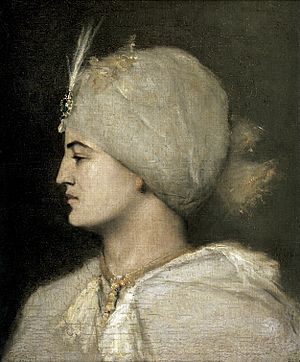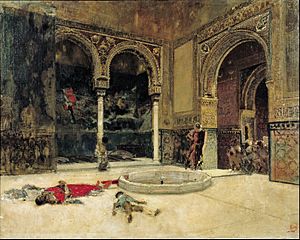Abencerrages facts for kids
The Abencerrages (pronounced Ah-ben-seh-RAH-hes) were a powerful family or group in the Kingdom of Granada during the 1400s. Their name likely comes from "Yussuf ben-Serragh," who was a leader of their tribe. He helped Muhammed VII, Sultan of Granada keep his throne during difficult times.


Not much is known for sure about the Abencerrages family. Some records say they arrived in Spain in the 700s. They became very famous because of a storybook called Guerras civiles de Granada (Civil Wars of Granada) by Ginés Pérez de Hita. This book tells about the fights between the Abencerrages and another family called the Benedin. It also describes how the Abencerrages were treated badly.
Other writers like J. P. de Florian and Chateaubriand later wrote their own versions of Pérez de Hita's story.
The Legend of the Alhambra
A famous legend tells a sad story about the Abencerrages. It says that one of the Abencerrages fell in love with a princess from the royal family. He was caught trying to visit her window. This made Ibrahim Benedin very angry, as he had a long-standing disagreement with the Abencerrages family.
The story goes that Ibrahim Benedin ordered the entire Abencerrages family to be trapped in one of the beautiful halls of the Alhambra palace. There, he ordered them to be killed. The room where this is said to have happened is still called the Hall of the Abencerrages today. It is one of the most beautiful parts of the Alhambra.
Fact or Fiction?
Washington Irving, a famous writer, wrote about the Alhambra in his book Tales of the Alhambra (1832). He believed that the story of the massacre was not true. He thought that some Abencerrages were indeed killed, but it happened during battles, not in a planned killing inside the palace.
Even though the story might not be completely true, it has inspired many artists. Many poems and plays have been written about the legend. There is also a short novel called The Abencerraje. Two operas, Les Abencérages by Luigi Cherubini and L'esule di Granata by Giacomo Meyerbeer, also tell parts of this dramatic story. The legend of the Abencerrages shows how powerful stories can be, even if they are not entirely factual.
See also
 In Spanish: Abencerrajes para niños
In Spanish: Abencerrajes para niños
 | Bayard Rustin |
 | Jeannette Carter |
 | Jeremiah A. Brown |

